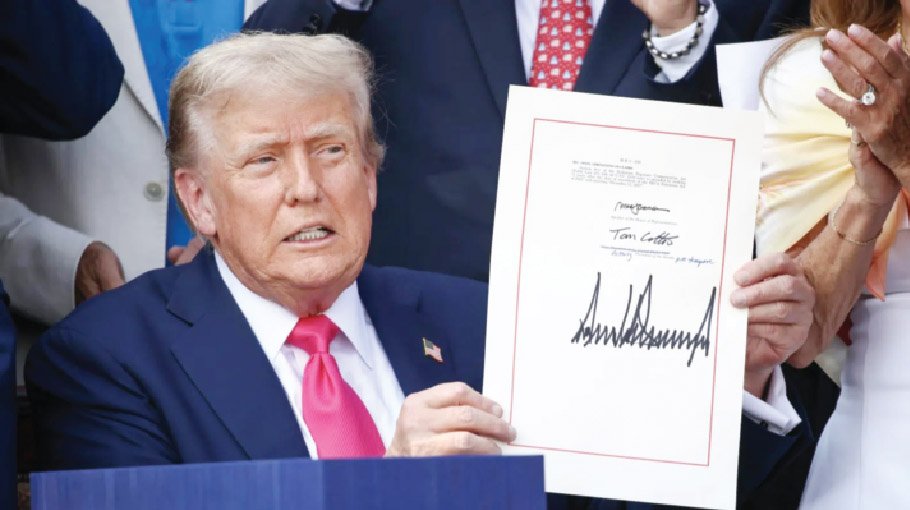Trump’s tariff sets alarm bells ringing for exporters

Uncertainty has mounted in Bangladesh’s manufacturing sector as the United States has officially imposed a 35 percent tariff on all goods imported from Bangladesh, effective August 1, 2025.
The decision, outlined in a letter from US President Donald Trump to Dr. Muhammad Yunus, Chief Adviser of Bangladesh's interim government, marks a significant escalation in trade tensions and is expected to have a severe impact on Bangladesh's robust export sector, particularly the vital ready-made garment (RMG) industry.
This new tariff, a slight reduction from an earlier proposed 37 percent but still substantially higher than the previous average rate of 15 percent, places Bangladesh at a significant disadvantage compared to regional competitors like Vietnam, which reportedly faces a lower 20 percent tariff.
US President Donald Trump's letter to Chief Adviser Muhammad Yunus announcing the new rate also said it would be "separate from all sectoral tariffs", which means RMG could face an effective rate of 50% for entry into the US market.
Bangladesh's RMG industry, which accounts for over 80 percent of its total exports and nearly 8 percent of its GDP, is projected to be the most severely impacted. With the US being Bangladesh's single largest export destination, importing around $8 billion worth of Bangladeshi goods annually (over $6 billion of which is garments), the increased tariff will dramatically raise the cost of Bangladeshi textiles in the US market.
Experts warn this could lead to a significant decline in demand, factory slowdowns, and widespread job losses for the estimated 4 million people employed in the sector.
"This will be devastating," stated Katrina Ell, Director and Head of Asia-Pacific Economics at Moody's Analytics, highlighting that around 20% of Bangladesh's garment exports are shipped to the US.
In response, the Bangladeshi government is engaged in a diplomatic push, with Commerce Adviser Sheikh Bashiruddin leading negotiations with the United States Trade Representative in Washington, D.C. Bangladesh has offered several concessions, including boosting duty-free imports of American goods such as wheat, cotton, LNG, and soybeans, to narrow the more than $6 billion trade surplus it enjoys with the US.
The Bangladesh Garment Manufacturers and Exporters Association (BGMEA) is hiring US lobbyists to address potential US tariff hikes on Bangladeshi garment exports. This decision reflects the industry's concern about the government's progress on the issue.
BGMEA President Mahmud Hasan Khan said that the US is a very lucrative market for Bangladesh, so the government has to make a concerted effort to reduce tariffs to a reasonable level.
The BGMEA aims to influence US trade policy and protect the interests of Bangladeshi garment manufacturers in the US market.
The lobbyist appointment is a lengthy process which needs some time. The government has already sent some lucrative proposals for the US including bonded warehouse for US cotton exporters, he said.
“Tariff reduction or extension of time for imposing new tariffs for Bangladesh, all the matters are depending on the US president. So we do more while the tariff will be reduced, otherwise an alternative way would be a better option,” said BGMEA President.
Zahid Hussain, former lead economist, World Bank Dhaka office, told UNB that Bangladesh will be ahead of some countries while behind some countries in apparel tariffs imposed to access the US market.
“As the issue under discussion between US and Bangladesh, the tariff is not fixed yet for some other countries, so, in plus-minus what our position will be, it will take some more time to know,” he pointed out.
“If Bangladesh faces a 35 percent tariff while India, Pakistan and Sri Lanka face lower tariffs, then we (Bangladesh) may lose upto 20 percent of our existing export volume in the US market,” he opined.
Mustafa K. Mujeri, former Chief Economist of Bangladesh Bank (BB), said that Bangladesh has to give priority to increasing its adaptation in the manufacturing sector, which is more important than allowing duty-free entry of US products in the domestic market.
He said that US’s present trade policy is not stable as it is continuously violating trade rules set by the World Trade Organization (WTO).
Khondkar Golam Moazzem, Research Director at the Centre for Policy Dialogue (CPD) told UNB that Bangladesh needs to influence US buyers who build their billion dollar businesses based on the country’s (Bangladesh) apparel sector.
He opposed excessive and unnecessary import from US, which will be economically very costly. Rather US buyers and farmers could work in favour of Bangladesh as their products (cotton) is used in the apparel sector.
The immediate outlook for Bangladesh's export economy remains uncertain. While some top exporters believe the 35 percent figure is a negotiating tactic and will eventually be reduced, economists caution that the outcome depends on the corresponding tariffs levied on other major garment exporters like China, India, and Pakistan.
For Bangladesh, the tariffs serve as an urgent wake-up call to diversify its export markets beyond the US and to explore new opportunities in regions like the EU, UK, Canada, and Australia. Industry experts are also calling for a shift towards producing more value-added products, strengthening trade relations through robust government-to-government diplomacy, and ensuring internal political stability to attract and retain international buyers.
The focus is now on strategic choices to navigate this complex global trade landscape.



